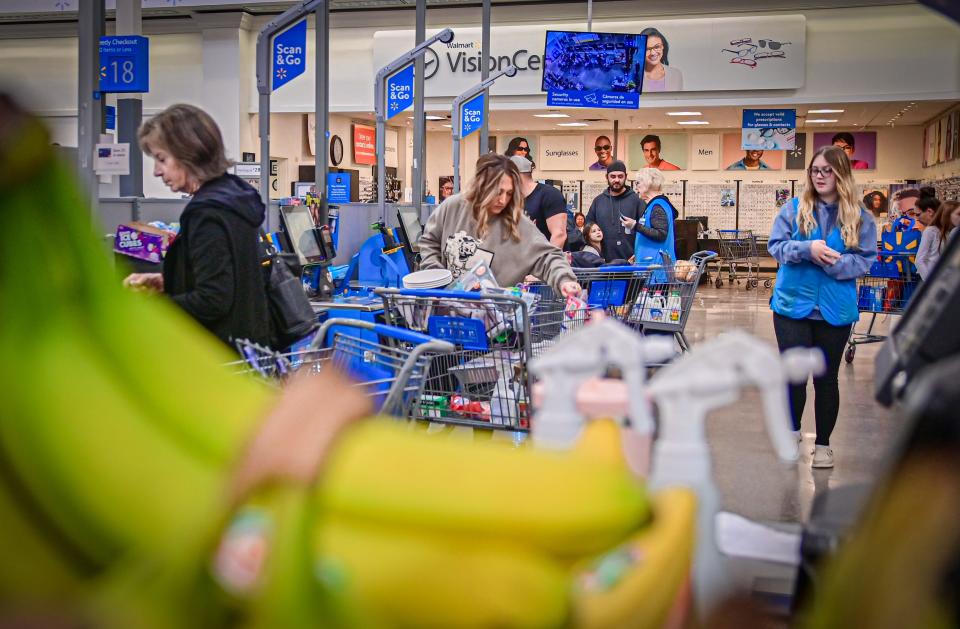Loveland voters may ax the city's tax on groceries Nov. 7; city worries about lost revenue
The average family of four with two teenagers spent between $1,116 and $1,375 on groceries in August, according to the U.S. Department of Agriculture.
For Loveland grocery shoppers, that spending level would come with an additional $33.48 to $41.25 in sales taxes based on the city's 3% tax rate on food for home consumption.
On Nov. 7, Loveland voters will decide on a citizen-led initiative to eliminate the grocery tax effective Jan. 1.
Here's the ballot language on Loveland Question 300:
"Shall Article 12 of the Loveland City Charter be amended to add Section 12-3 to provide that Council shall make no law, nor continue any law, which imposes any tax or fee on the retail sale of any human food for home consumption, and shall such amendment become effective on January 1, 2024?"
A "yes" vote would eliminate the 3% sales tax.
A "no" vote would keep the tax in place.
Supporters of Question 300 say the tax is regressive and unfairly impacts those with lower incomes who pay a higher percentage of their income toward necessities like food, said George Garklavs, spokesperson for LetUsVoteFoodTax23, the group that initiated the petition drive to get the issue on the ballot. "Wouldn't it be nice to give those folks a break?"
LetUsVote estimates eliminating the tax could save an average family up to $500 each year.

Loveland officials caution the savings will come at the expense of municipal services and programs. The city stands to lose about $10.5 million in annual revenue if the grocery tax is eliminated, according to Chief Financial Officer Brian Waldes. Increases in other revenue streams such as property taxes would allow the city's general fund to keep pace with inflation but can't be expected to cover the $10.5 million loss, Waldes said.
"As revenues go up, our expenses track with them," Waldes said. "Inflation pushes up our sales tax dollar volume and our expenses. Expenses are rocking up especially in the construction area, and Loveland has a lot of construction."
Some residents have pointed to a $19 million surplus the budget was currently showing as an indication the city could cover the loss of grocery tax revenue.
Waldes said about $18 million is already appropriated to multiyear capital projects. "It can look like the general fund spent $19 million less than it took in but ... that money is already dedicated to existing projects and will be spent. We just haven't written the checks yet."
As of early October, the city's general fund had $900,000 in unassigned funds, he said.
The city doesn't have its own projections on how much households would save if the grocery tax is eliminated because it varies widely, Waldes said.
City Council members had considered, but voted against, putting their own measure on the ballot to add an additional sales tax of 0.57% to other sales made in the city to compensate for the financial loss should the grocery tax be eliminated.
Now it will wrestle with where to make cuts. Workforce and program reductions are likely but won't be known until after Oct. 17 when council will review a list of potential cuts from Waldes' office.
Cuts will come in "quality of life" amenities and services, said Alyssa Wells, spokesperson for Protect Loveland's Future, a group formed to fight Question 300 and 301, the latter of which would require projects in the Loveland Urban Renewal Authority be voted on by the electorate.
"Taking away $10 million without a contingency plan is incredibly scary," Wells said. Shoppers will save some money, but the savings "is very minimal in the scheme of what it will cost us ... the impact will be tenfold."
Sales tax revenue is the largest single source of revenue in the city's general fund and is expected to provide about $65.1 million of the anticipated $127.9 million general fund budget next year if the food tax remains in place. The tax on food for home consumption accounts for 16% of city sales tax revenue, or about $10.5 million, based on 2023 figures, Waldes said.
If Question 300 passes, Loveland will be the only municipality in Larimer County that does not charge a tax on groceries purchased for home consumption.

Fort Collins and Timnath's sales tax rate on groceries is 2.25%, Wellington residents pay 3%, Greeley, 3.46% and Windsor, 3.65%.
The state of Colorado gives cities and counties the option of taxing food. Those that do tax food must still exempt purchases made with food stamps or vouchers from the federal Women, Infant and Children's program, according to state law.
Recent Loveland City Council discussions have focused on across-the-board cuts rather than preserving public safety funding and cutting other services, departments and programs more deeply should the measure pass.
Council, the city's Citizen Finance Advisory Board and Cultural Services board have passed resolutions opposing the ballot measure.
Several residents have accused council of fearmongering by talking about job cuts and program closures if the tax on groceries is eliminated.
"You guys are scaring everyone to death," said Bob Massaro. "It's immoral what you're doing to the staff. They're being told there will be staff cuts. They've been nervous wrecks and that comes from this dais."
Zeke Cortez, a candidate for Loveland City Council District 4 and father of three, told council in early October that eliminating the food tax would save his family between $350 and $500 a year, or $41 a month. If he made seven trips to the store in a month, it would amount to $5 per trip "about as much as a Starbucks coffee," he said. "We're not going to notice that. We will notice if we go to the park and the splash park is not operating. My kids will notice there's no water at the splash park. The tradeoff for the $6 I might save is well worth it for me and my family."

While $5 a week doesn't make a difference to some families, it does to others, Garklavs said. "There are a lot of folks that have had to tighten their belts."
Loveland's Police Citizen Advisory Board did not take a position on the measure, but a letter from Chairman Bill Kurtz expressed concerns that the ballot measure would negatively affect the police department's budget and overall public safety.
Kurtz said the board wants City Council to adopt initiatives that supplement the loss of tax revenue should Ballot 300 pass. "It would be in the best interest of the city that initiatives be implemented as soon as possible in order to ensure public safety remains a top priority and is not compromised."
This article originally appeared on Fort Collins Coloradoan: Loveland voters may ax the city's tax on groceries Nov. 7

